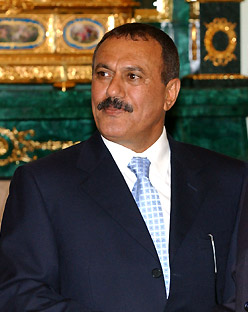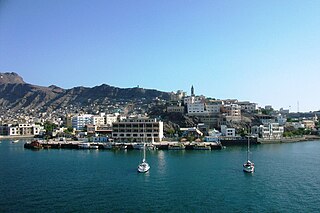Related Research Articles

Ali Abdullah Saleh al-Ahmar was a Yemeni politician who served as the first President of Yemen, from Yemeni unification on 22 May 1990 to his resignation on 25 February 2012, following the Yemeni Revolution. Previously, he had served as President of the Yemen Arab Republic, or North Yemen, from July 1978 to 22 May 1990, after the assassination of President Ahmad al-Ghashmi.
The Houthi insurgency, also known as the Houthi rebellion, the Sa'dah War, or the Sa'dah conflict, was a military rebellion pitting Zaidi Shia Houthis against the Yemeni military that began in Northern Yemen and has since escalated into a full-scale civil war. The conflict was sparked in 2004 by the government's attempt to arrest Hussein Badreddin al-Houthi, a Zaidi religious leader of the Houthis and a former parliamentarian on whose head the government had placed a $55,000 bounty.

The Houthi movement, officially called Ansar Allah and colloquially simply Houthis, is an Islamist political and armed organization that emerged from the Yemeni governorate of Saada in the 1990s. The Houthi movement is a predominately Zaidi Shia force, whose leadership is drawn largely from the Houthi tribe.

The Al-Qaeda insurgency in Yemen is an ongoing armed conflict between the Yemeni government, the United States and their allies, and al-Qaeda-affiliated cells in Yemen. It is a part of the Global War on Terror.

Abdul-Malik Badruldeen al-Houthi or Abu Jibril is a Yemeni politician and religious leader who serves as the leader of the Houthi movement, a revolutionary movement principally made up of Zaidi Muslims. His brothers Yahia and Abdul-Karim are also leaders of the group, as were his late brothers Hussein, Ibrahim, and Abdulkhaliq. Abdul-Malik Houthi is the leading figure in the Yemeni Civil War which started with the Houthi takeover in Yemen in the Saada Governorate in northern Yemen.

The siege of Dammaj began in October 2011 when the Houthis, a Zaydi-led rebel group which controls the Sa'dah Governorate, accused Salafis loyal to the Yemeni government of smuggling weapons into their religious center in the town of Dammaj and demanded they hand over their weapons and military posts in the town. As the Salafis refused, Houthi rebels responded by imposing a siege on Dammaj, closing the main entrances leading to the town. The town was controlled by the Houthis and the fighting was mainly centered at Dar al-Hadith religious school, which was operated by Salafis.

Yemeni peace process refers to the proposals and negotiations to pacify the Yemeni Crisis by arranging a power transfer scheme within the country and later cease-fire attempts within the raging civil war. While initially unsuccessful, the reconciliation efforts resulted with presidential elections, held in Yemen in February 2012. The violence in Yemen, however, continued during the elections and after, culminating in Houthi seizure of power and the ensuing civil war.

India–Yemen relations refer to the current and historical relationship of the India and Yemen. Diplomatic relations between these countries were established in November 1967 when India recognized Yemen's independence from the United Kingdom. Relations continue to be in good shape notwithstanding India's close partnership with Saudi Arabia or Yemen's close ties with Pakistan.

The Houthi takeover in Yemen, also known as the September 21 Revolution, or 2014–15 coup d'état, was a popular revolution against Yemeni President Abdrabbuh Mansur Hadi led by the Houthis and their supporters that pushed the Yemeni government from power. It had origins in Houthi-led protests that began the previous month, and escalated when the Houthis stormed the Yemeni capital Sanaa on 21 September 2014, causing the resignation of Prime Minister Mohammed Basindawa, and later the resignation of President Abdrabbuh Mansur Hadi and his ministers on 22 January 2015 after Houthi forces seized the presidential palace, residence, and key military installations, and the formation of a ruling council by Houthi militants on 6 February 2015.
The following lists events that happened in 2015 in Yemen.

The Yemeni Crisis began with the 2011–2012 revolution against President Abdullah Saleh, who had led Yemen for 33 years. After Saleh left office in early 2012 as part of a mediated agreement between the Yemeni government and opposition groups, the government led by Saleh's former vice president, Abdrabbuh Mansur Hadi, struggled to unite the fractious political landscape of the country and fend off threats both from Al-Qaeda in the Arabian Peninsula and from Houthi militants that had been waging a protracted insurgency in the north for years.

The Battle of Aden was a battle for the control of Aden, Yemen, between Houthis rebels and Yemen Army forces loyal to Ali Abdullah Saleh on one side, and Yemen Army units loyal to Abdrabbuh Mansur Hadi and Southern Movement militias on the other side.

The Yemeni civil war is an ongoing multilateral civil war that began in late 2014 mainly between the Rashad al-Alimi-led Presidential Leadership Council and the Mahdi al-Mashat-led Supreme Political Council, along with their supporters and allies. Both claim to constitute the official government of Yemen.

On 26 March 2015, Saudi Arabia, leading a coalition of nine countries from West Asia and North Africa, launched an intervention in Yemen following a request from Yemeni president Abdrabbuh Mansur Hadi for military support after his forces were ousted from Sanaʽa by Houthi insurgents during the Yemeni Civil War. Government forces, Houthi rebels, and other armed groups fought after the draft constitution and power-sharing arrangements collapsed, despite progress made by the UN during the political transition at that time. Violence escalated in mid-2014. Houthis and allied insurgents seized control of Sana'a in September 2014 and thereafter. In response, President Hadi asked Saudi Arabia to intervene against the Iranian-backed Houthis.

Operation Raahat was an operation of the Indian Armed Forces to evacuate Indian citizens and foreign nationals from Yemen during the 2015 military intervention by Saudi Arabia and its allies in that country during the Yemeni Crisis. The evacuation by sea began on 1 April 2015 from the port of Aden. The air evacuation by the Indian Air Force and Air India commenced on 3 April 2015 from Sana'a. More than 4,640 Indian citizens in Yemen were evacuated along with 960 foreign nationals from 41 countries. The air evacuation ended on 9 April 2015 while the evacuation by sea ended on 11 April 2015.
International reactions to the Saudi-led intervention in Yemen of 2015 were mixed. Most other Arab League nations and several Western governments backed the Saudi Arabia-led military coalition, but other governments warned against an escalation in the violent situation in Yemen.

The evacuation of Pakistani citizens was a civil-military combined effort by Pakistan to extract and evacuate overseas Pakistanis from war-torn areas of Yemen.
The 2022 Abu Dhabi attack was a terrorist attack against three oil tanker trucks and an under construction airport extension infrastructure in Abu Dhabi, United Arab Emirates conducted by the Houthi movement using drones and missiles. Although several missiles and drones were intercepted, 3 civilians were killed and 6 were injured by a drone attack.
References
- ↑ "11 Indians among those rescued by Pakistan from Yemen". 5 April 2015.
- ↑ "600 Pakistanis reach Hudaidah safely from the Yemeni war-torn capital". 28 March 2015.
- ↑ "Archived copy" (PDF). Archived from the original (PDF) on 2010-05-24. Retrieved 2017-11-24.
{{cite web}}: CS1 maint: archived copy as title (link) - ↑ "200 Pakistanis in Aden to be evacuated to Djibouti today".
- ↑ "Eighteen Pakistanis released from Yemen jails | Pakistan | DAWN.COM". public.dawn.com. Archived from the original on 25 August 2011. Retrieved 6 June 2022.
- ↑ Al-Arabiya: Pakistanis fighting in Yemen with Houthis